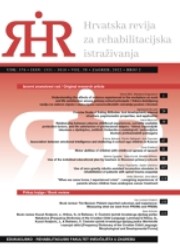‘’WHEN WE CAME HOME, I EXPERIENCED CRISIS” - CAREGIVING EXPERIENCES OF PARENTS WHOSE CHILDREN HAVE UNDERGONE CANCER TREATMENT
‘’WHEN WE CAME HOME, I EXPERIENCED CRISIS” - CAREGIVING EXPERIENCES OF PARENTS WHOSE CHILDREN HAVE UNDERGONE CANCER TREATMENT
Author(s): Anita Džombić, Irena BezićSubject(s): Clinical psychology, Behaviorism, Health and medicine and law
Published by: Sveučilište u Zagrebu, Edukacijsko-rehabilitacijski fakultet
Keywords: cancer; children; parenting; fears; anxiety; survival;
Summary/Abstract: The aim of this study was to gain an understanding of the caregiving experiences of parents whose children have completed cancer treatment. Data was collected across six focus groups involving 24 parents whose children had completed treatment for various types of cancer. Through interpretative phenomenological analysis, the following themes emerged: a) feelings of uncertainty and fear, b) staying in the role of the ill child’s parent, c) the need to learn new parenting skills, d) effect on other children in the family, and e) changes in the parents themselves. Participating parents mentioned feelings of constant anxiety, as well as a range of other kinds of fears they faced upon returning home (fear of medical care not being available on the spot, fear of the unknown, and fear of disease recurrence). They recognised their own altered behaviour toward the child who had undergone treatment (they were likely to limit the daily functioning of their child and act as if the child was still sick). The participants were also aware of the need to learn different, more appropriate parenting skills, as well of the sense of guilt they felt for neglecting their other children. They pointed out the changes in their own physical and mental health, as well as the difficulties they faced in social and work environments. These parents reported that they did not feel sufficiently prepared to care for their child upon completion of hospital treatment. In fact, for some, parent-led care was more difficult than the treatment itself. Our results suggest the need to implement family-oriented follow-up as an integral component of childhood cancer treatment in the Balkan countries. This will help parents alleviate anxiety, balance supervision, and help them adapt to their new normal after their child survived cancer treatment.
Journal: Hrvatska revija za rehabilitacijska istraživanja
- Issue Year: 58/2022
- Issue No: 2
- Page Range: 118-129
- Page Count: 12
- Language: English

